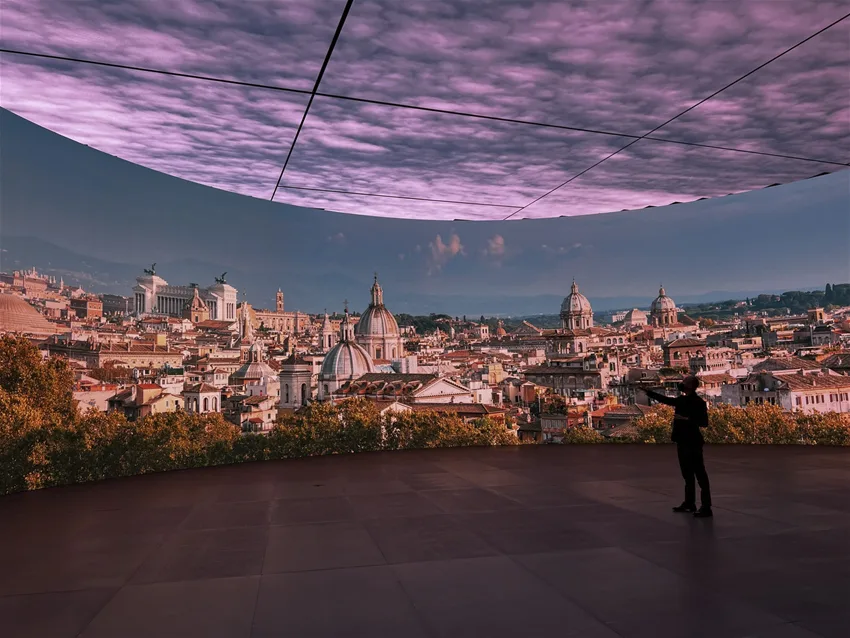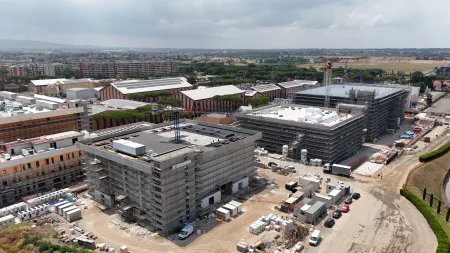13 March 2023
Maccanico: Cinecittà’s New Era
Cinecittà has never been so busy with serial, international, Italian, television, theatrical productions

VENICE – Without Blood directed by Angelina Jolie and based on Alessandro Baricco’s novel, starring Salma Hayek and Demián Bichir, Conclave by Edward Berger with Ralph Fiennes and Stanley Tucci, Finally Dawn by Saverio Costanzo with Lily James and Willem Dafoe, Paola Cortellesi’s directing debut produced by Wildside for Vision Distribution, the M series, based on Antonio Scurati’s books and directed by Joe Wright, the new film by Pietro Castellitto, Comandante by Edoardo De Angelis co-written with Sandro Veronesi are just a few of the titles in production at Cinecittà, which “has never been so busy with serial, international, Italian, television, theatrical productions,” as CEO Nicola Maccanico told reporters at the Venice Film Festival during an informal meeting.
The keyword for the Studios undergoing total renewal is “future.” “We are working to make Cinecittà grow through an ambitious and precise development project. We are already sold out for 2022 and the first half of 2023 and are working to achieve the same result for the second half of the new year,” said Maccanico. “We want to ensure that Cinecittà is a landmark infrastructure for the country, with all accounts in order. In the first phase, we worked on making the 19 studios function at full capacity with paramount professionals: in April 2021, the theaters were at 40- 50%, with only a couple of productions on average. Today we have full soundstage occupancy with 11 productions on sets and 5/6 in post-production, with an average entry to Cinecittà of nearly 2,500 people: Italian and independent producers, streamers, majors.”
Our commitment also revolves around technological innovation and sustainability, which are fundamental to becoming market protagonists. Ecologically, we aim to become carbon neutral in 5 years and have zero impact by 2030. “These parameters also affect production choices. We have one of the largest Smart Stages in Europe: the brand new T18 includes a Smart Stage with a led wall to recreate any high-definition digital environment, a rapidly developing technology. We’ve shifted from green screen VR, which involved complex post-production, to led walls where pre-production is crucial. Cinecittà offers a Smart Stage with a 3767.37 ft2 screen where any environment can be recreated. Pure avant-garde, and the first to use it was Angelina Jolie.”
Maccanico pinpoints another important fact, “Majors can function if the country’s system functions. For example, with production incentives.” The goal is a return to profit for Cinecittà’s financial statements, a tangible goal set by the 2023 industrial plan. Relations with prestigious audiovisual players have definitely strengthened. Cinecittà has signed a strategic contract with Fremantle for a five-year continuous lease of 6 Cinecittà studios to produce Italian and international films and TV series, and important new agreements have been signed with Lumina Studios for four theaters located in North Rome for the period necessary to build new studios.
The future of Cinecittà is closely linked to the achievement of the PNRR objectives, which envisages investments of 260 million euros by 2026. “We shall build five new studios in Cinecittà, increasing production capacity from 193,750 to 322,917 ft2. This should allow us to overcome one of Cinecittà’s current limitations since some theaters are too small for today’s needs and create additional spaces for high-level productions and series. The first theater built thanks to the PNRR funds will be a 37673 ft2 theater, the largest in Cinecittà.”
In addition to the current area (nearly 40 hectares), the acquisition of further 31 hectares is being finalized thanks to a pre-agreement with Cassa Depositi e Prestiti. Eight new studios will be built on 15 hectares, while the remaining 16 hectares will be dedicated to outdoor sets, the backlot. The tenders for expanding Cinecittà should be awarded by June 2023. “We can’t wait to have the new space to meet the great demand underway,” concluded Nicola Maccanico, “Having a larger Cinecittà will allow us to work on even more prominent films and seek further framework agreements.” More generally, Maccanico underlined the importance of movie theaters, “where the film experience can be enjoyed at the highest level. It is no coincidence to read about hypotheses of platforms considering the acquisition of exhibition groups.” Regarding the SWG research presented in Venice by DGCA, Maccanico stated, “This says three things: first, that those who watch TV series at home also go to the cinema; second, that the demand focuses on certain genres and the quality of the experience; and finally that theatrical windows don’t seem to be the solution to the problem.”



